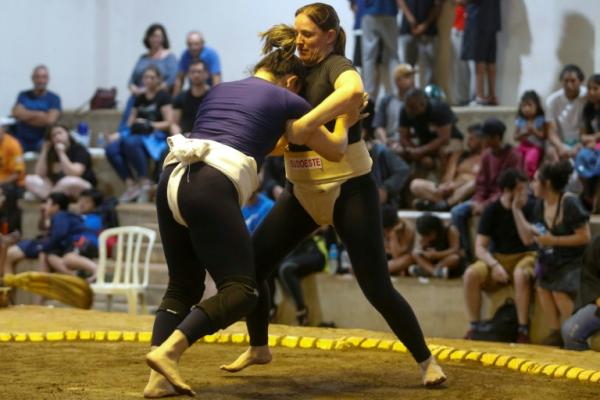Sao Paulo, Brazil: Valeria and Diana Dall’Olio, a mother-daughter sumo wrestling team from Brazil, have a message for those who picture a large Asian male in a loincloth when they hear the term “sumo wrestler”: reconsider.
The Dall’Olios are accustomed to hearing that they are too tiny, fragile, or female to participate in a sport typically associated with massive Japanese males.
However, they claim that this fuels their fighting spirit once they enter the “dojo” or ring.
“There is considerable prejudice. Some people assume you must be overweight if you practise sumo, Valeria, 39, tells AFP as she prepares for a competition at a public gym in Sao Paulo.
“Women are constantly scrutinised in the martial arts because these sports have traditionally been reserved for male fighters.”
As a young child, she began training in judo and jiu-jitsu.
In 2016, she fell in love with sumo, which was introduced to Brazil in the early 20th century by Japanese immigrants.
Soon, she ascended to the middleweight Brazilian national championship, which she won three times (2018, 2019 and 2021) in the middleweight division. (65 to 73 kilograms, 143 to 161 pounds).
In 2021, she added the South American championship to her collection of trophies.
Additional fighting spirit
“I attempt to maintain a balance between my various roles: housewife and mother of two. “I have very little free time,” Valeria explains.
In Japan, women are prohibited from participating in professional sumo.
In its birthplace, the highly ritualised sport has been associated with the Shinto religion for over 1,500 years, whose adherents have traditionally viewed women as immoral or unlucky for sumo.
In the past, women were not permitted to witness sumo matches or even contact the competitors.
Since 2001, however, an international amateur women’s sumo championship has been contested. Organizers aim to make it an Olympic sport one day.
Valeria states that being permitted to compete is a major victory for her team.
We have greater fighting spirit than males, who are typically not accustomed to fighting on as many fronts as we are.
Diana, age 18, claims she never had much interest in wrestling until the pace of sumo drew her in.
The bouts, in which competitors attempt to throw or drive one another from a circular, dirt-floored enclosure, rarely last longer than 30 seconds.
Power, stratagem, and skill are indispensable.
In 2019, Diana donned a “mawashi,” or sumo loincloth, for the first time.
She is currently a lightweight. (under 65 kilograms).
“You can feel the prejudice,” she says of the reactions of others to her sport of choice.
“Many people say that women are fragile, that they get hurt and then quit,” she says.
This is one of the things we are learning to combat. My cohort is on the rise.”
Fight For Respect
According to Oscar Morio Tsuchiya, the president of the Brazilian Sumo Confederation, women are largely responsible for Sumo’s rapid growth in Brazil.
Approximately half of the country’s 600 sumo wrestlers are female, he says.
“Because Shinto rituals prohibited women from even entering the arena, many traditionalists were appalled when women began to compete. “However, these obstacles are being overcome,” he says.
Diana won one of her three contests, while Valeria was defeated by Luciana Watanabe, the 18-time Brazilian middleweight champion, in her only bout. The Dall’Olios are cleaning the dojo at their Sao Paulo gym after a difficult day.
Also read: WPL 2023 UP vs MI: UP Warriorz end Mumbai Indians’ winning streak
Watanabe, who is 37 years old, is the face of sumo in Brazil.
She teaches children the sport in Suzano, a small hamlet with a significant Japanese-Brazilian population located 50 kilometres (31 miles) outside of Sao Paulo.
“Men are typically the sumo instructors,” she explains.
“However, I believe I inspire children when I display my titles.”
She also states that her objective is to “end prejudice.”
She states, “I want people to respect this sport more.”
“Many people continue to believe that it is only a sport for obese males. Sumo is open to all.”




